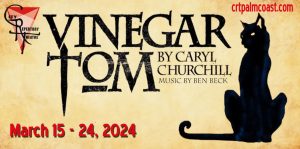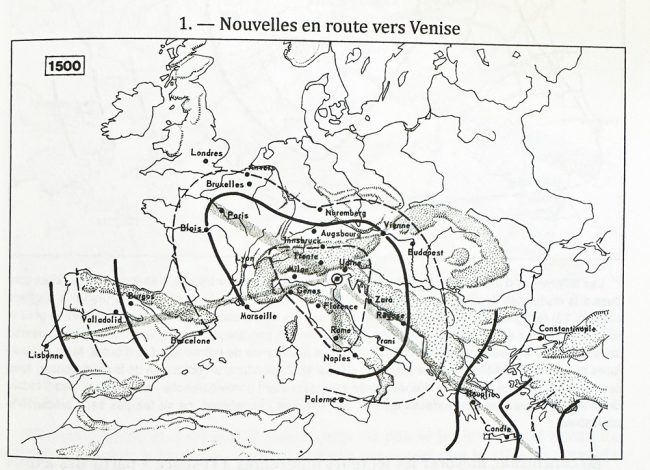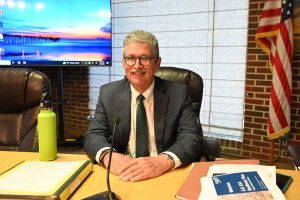
To include your event in the Briefing and Live Calendar, please fill out this form.
Weather: Partly sunny this morning, then clearing. Highs in the upper 80s. West winds 5 to 10 mph. Tonight: Mostly clear in the evening, then becoming partly cloudy. Lows in the lower 60s. West winds 5 to 10 mph.See the daily weather briefing from the National Weather Service in Jacksonville here.
Today at a Glance:
Presidential Primary Early Voting is available today from 10 a.m. to 6 p.m. at four locations. Any registered and qualified voter who is eligible to vote in a county-wide election may vote in person at the early voting site. According to Florida law, every voter must present a Florida driver’s license, a Florida identification card or another form of acceptable picture and signature identification in order to vote. If you do not present the required identification or if your eligibility cannot be determined, you will only be permitted to vote a provisional ballot. Don’t forget your ID. A couple of secure drop boxes that Ron DeSantis and the GOP legislature haven’t yet banned (also known as Secure Ballot Intake Stations) are available at the entrance of the Elections Office and at any early voting site during voting hours. The locations are as follows:
- Flagler County Elections Supervisor’s Office, Government Services Building, 1769 East Moody Boulevard, Bunnell.
- Flagler County Public Library, 2500 Palm Coast Pkwy NW, Palm Coast.
- Palm Coast Community Center, 305 Palm Coast Parkway NE.
- Flagler Beach United Methodist Church, 1520 South Daytona Avenue, Flagler Beach.
The Saturday Flagler Beach Farmers Market is scheduled for 9 a.m. to 1 p.m. today at Wickline Park, 315 South 7th Street, featuring prepared food, fruit, vegetables , handmade products and local arts from more than 30 local merchants. The market is hosted by Flagler Strong, a non-profit.
Food Truck Palooza, Kick-off for the annual Food-A-Thon, is from 11 a.m. to 6 p.m. at Flagler Palm Coast High School, 5500 State Road 100, Palm Coast, with over 40 food trucks, kids free fun zone, prizes, and live entertainment that includes Southern Chaos and Robert Keele. $5 parking will benefit Grace Community Food Pantry.
 Caryl Churchill’s ‘Vinegar Tom,’ at City Repertory Theatre, 160 Cypress Point Parkway (City Marketplace, Suite B207), Palm Coast, 7:30 p.m. $15-$30. Book tickets here. From Director John Sbordone’s program notes: Caryl Churchill’s VINEGAR TOM, written in collaboration with the Monstrous Regiment Theatre Company, uses the hunt for witches in the 17th century, as stool to investigate the subjugation of women in a male dominated society. The lessons of the past, though more blatant than the present, are reflected in many aspects of our own society. Churchill, a leading feminist writer in Britain for over 50 years, explores the free spirited Alice, the subservient Susan, the caged in Betty, the destitute Joan and the ever helpful Ellen in the context of their repressive environment. She uses modern techniques such as the episodic scene to convey the pervasiveness of the subjugation without absorbing the audience in emotional crisis. She asks us to observe the behaviors without getting lost in their melodrama. One technique establishes these goals graphically. The songs are intended to covey a contemporary commentary on the behavior of the past. CRT is proud to present this daring exploration and thankful to Benjamin Beck for composing the compelling music to accompany our efforts.
Caryl Churchill’s ‘Vinegar Tom,’ at City Repertory Theatre, 160 Cypress Point Parkway (City Marketplace, Suite B207), Palm Coast, 7:30 p.m. $15-$30. Book tickets here. From Director John Sbordone’s program notes: Caryl Churchill’s VINEGAR TOM, written in collaboration with the Monstrous Regiment Theatre Company, uses the hunt for witches in the 17th century, as stool to investigate the subjugation of women in a male dominated society. The lessons of the past, though more blatant than the present, are reflected in many aspects of our own society. Churchill, a leading feminist writer in Britain for over 50 years, explores the free spirited Alice, the subservient Susan, the caged in Betty, the destitute Joan and the ever helpful Ellen in the context of their repressive environment. She uses modern techniques such as the episodic scene to convey the pervasiveness of the subjugation without absorbing the audience in emotional crisis. She asks us to observe the behaviors without getting lost in their melodrama. One technique establishes these goals graphically. The songs are intended to covey a contemporary commentary on the behavior of the past. CRT is proud to present this daring exploration and thankful to Benjamin Beck for composing the compelling music to accompany our efforts.
Democratic Women’s Club of Flagler County meeting at 6 p.m. at the Palm Coast Community Center, 305 Palm Coast Parkway NE.
Live From the Waterworks: Gamble Rogers Folk Festival’s Monthly Concert Series every third Saturday at The Waterworks, 184 San Marco Avenue St. Augustine. Doors open at 6 p.m., music starts at 7. The annual event celebrating the life and music of folk legend Gamble Rogers. Through June 2024. Check performers and book tickets here. Read more details about the festival here.
Random Acts of Insanity’s Roundup of Standups from Around Central Florida, 8 p.m. at Cinematique Theater, 242 South Beach Street, Daytona Beach. General admission is $8.50. Every third Saturday RAI hosts Live Standup Comedy with comics from all over Central Florida.
Grace Community Food Pantry, 245 Education Way, Bunnell, drive-thru open today from 10 a.m. to 1 p.m. The food pantry is organized by Pastor Charles Silano and Grace Community Food Pantry, a Disaster Relief Agency in Flagler County. Feeding Northeast Florida helps local children and families, seniors and active and retired military members who struggle to put food on the table. Working with local grocery stores, manufacturers, and farms we rescue high-quality food that would normally be wasted and transform it into meals for those in need. The Flagler County School District provides space for much of the food pantry storage and operations. Call 386-586-2653 to help, volunteer or donate.
Notably: Two generations have now come of age since the early days of AOL’s “you’ve got mail.” (A digression, as all things in this space are: remember that sound? It seems to me very sad that the man who gave us that sound was tracked down by a local television station–as he was driving for Uber, and had him, like a monkey, perform the famous line. You’d have thought royalties for that bit heard billions of time for a few years might’ve saved him from Grub Street.) What I’m getting at is the obliteration of delays in mail, texts, messaging. I don’t think we realize to what extent that’s changed our history, changed us, psychologically, changed just about everything we do and most things we are. But it takes thinking about how things were previously, before telegrams and telexes and phones and telegraphs, to get a sense of the momentous change. Fernand Braudel, that great French historian–Vico with footnotes–in his redolent The Mediterranean and the Mediterranean World in the Age of Philip II, has a few pages on the subject: the time it took for mail, goods, travelers to make it from one point of the Mediterranean to another at the end of the 15th century. He documented it. That was Braudel’s strength: he was of the Annales School of historiography, forging a whole new way of studying the past by exhaustively analyzing it from the bottom up: deaths records, land records, birth records, shipping records in their every detail, households’ demographics and wealth, or more often lack of wealth, and so on. He also calculated the time it took for people and goods to move across these then-so vast distances, by studying–documenting–how long it actually took for a letter to travel, choosing Venice as his starting point. So: A week for a letter to make it to Rome. Not so bad, really, considering that my own letters to others in Palm Coast can take five or six days to get there. Two weeks to make it the heel of Italy, or to Paris, or to Vienna. Three weeks to make it to Dover (not quite London), or Palermo in Sicily, or Barcelona on the Mediterranean. Four to make it to Greece and not quite Madrid, and six to make it to Constantinople. Imagine that: six weeks there, six weeks back, for word about any diplomatic moves in the making, any foreign relations issue, any dispute over treaty obligations. The crossings of the Atlantic were equally long, and for a long time: those distances did not start shrinking in meaningful senses until the advent of rail, then cars and highways, which happened to coincide with the advent of the telegraph, which changed everything. But did it? Obviously you’ve figured out my punch line, lifted from Thoreau’s Walden: “We are in great haste to construct a magnetic telegraph from Maine to Texas; but Maine and Texas, it may be, have nothing important to communicate. Either is in such a predicament as the man who was earnest to be introduced to a distinguished deaf woman, but when he was presented, and one end of her ear trumpet was put into his hand, had nothing to say. As if the main object were to talk fast and not to talk sensibly. We are eager to tunnel under the Atlantic and bring the old world some weeks nearer to the new; but perchance the first news that will leak through into the broad, flapping American ear will be that the Princess Adelaide has the whooping cough. After all, the man whose horse trots a mile in a minute does not carry the most important messages; he is not an evangelist, nor does he come round eating locusts and wild honey. I doubt if Flying Childers ever carried a peck of corn to mill.”
—P.T.
View this profile on Instagram
![]()
The Live Calendar is a compendium of local and regional political, civic and cultural events. You can input your own calendar events directly onto the site as you wish them to appear (pending approval of course). To include your event in the Live Calendar, please fill out this form.
December 2025
Free For All Fridays With Host David Ayres on WNZF
Friday Blue Forum
Rotary’s Fantasy Lights Festival in Palm Coast’s Town Center
The Bronx Wanderers at the Fitzgerald Performing Arts Center
‘Annie,’ at Limelight Theatre
Irving Berlin’s Holiday Inn
‘Greetings,’ A Christmas Comedy
Santa in Bunnell
Flagler Beach Farmers Market
Coffee With Flagler Beach Commission Chair Scott Spradley
Grace Community Food Pantry on Education Way
Second Saturday Plant Sale at Washington Oaks Gardens State Park
American Association of University Women (AAUW) Meeting
Peps Art Walk Near Beachfront Grille
Gamble Jam at Gamble Rogers Memorial State Recreation Area
For the full calendar, go here.

Thoreau, as it turned out, was precisely correct. He grasped that the telegraph would create its own definition of discourse; that it would not only permit but insist upon a conversation between Maine and Texas; and that it would require the content of that conversation to be different from what Typographic Man was accustomed to. The telegraph made a three-pronged attack on typography’s definition of discourse, introducing on a large scale irrelevance, impotence, and incoherence. These demons of discourse were aroused by the fact that telegraphy gave a form of legitimacy to the idea of context-free information; that is, to the idea that the value of information need not be tied to any function it might serve in social and political decision-making and action, but may attach merely to its novelty, interest, and curiosity. The telegraph made information into a commodity, a “thing” that could be bought and sold irrespective of its uses or meaning.”
–From Neil Postman’s Amusing Ourselves to Death (1986) .













































Ray W. says
The Vinegar Tom piece prompted memories of a German language college professor who introduced the class to Bertolt Brecht in his original German. A quick quote check turned up an apropos quote in today’s charged political atmosphere:
“What a miserable thing life is: you’re living in clover, only the clover isn’t good enough.”
I commonly commented to my then-young children that if every day has to be special, then special will soon become ordinary. Extra-special will become the new special until it, too, becomes ordinary. Super-special will become the new special until it, too, becomes ordinary. In time, fantastic will become the new special and you will be lost because it, in time, will no longer be good enough. Once that happens, nothing can ever be good enough. If you ever lose the ability to enjoy a simple beanie-weanie dinner ….
To my paternal grandmother, a peanut butter, banana and mayonnaise sandwich was the ideal nutritious snack for growing children.
We have fewer than eight months to go before this election season cycles through all its necessary waves of hyperbole, exaggeration, minimization, deception, misinformation, disinformation, paranoia, conspiratorial thinking, and every other method by which the “pestilential” partisan members of faction among us will attempt to sway the election. We will all get through it, though I remain concerned that the vengeful among us will see opportunity to wreak violence on all perceived enemies. Accepting the idea that our favored candidates are not special people can save us all much trauma, but that does not inhere if the politics of factional thinking.
Pogo says
@Ray W.
“…a peanut butter, banana and mayonnaise sandwich…”
My favorite brunch.
“… We will all get through it…”
Some, more than others. What, I wonder, will Putin and Trump do with the world that our electoral college creates for them?
Ray W. says
Hello Pogo.
America has survived many threats to the Constitution, dating from the founding of our nation. Shay’s Rebellion comes to mind.
In “Thomas Jefferson – An Intimate History”, published in 1974, Fawn M. Brodie writes of Jefferson’s first vice-president, Aaron Burr, who utterly failed in his attempt to overthrow the government in 1806 after he had left the vice-presidency (Burr sought to sever off all American lands west of the mountains to form a new nation):
“Nothing better illuminates Burr’s capacity for the ‘big lie’ – a technique used with success by many delusional personalities in politics – than his famous cipher letter to General James Wilkinson on July 29, 1806. Though he had been turned down coldly by both England and Spain, he wrote that ‘naval protection’ of England is secure,’ that a British squadron was promised for outside New Orleans, and that he himself would rendezvous with Wilkinson at Natchez with the first five hundred or thousand men by December 15. ‘The govt invite us to glory and fortune,’ he concluded. “It remains to be seen whether we deserve the boon.’ Actually, Burr had nothing except $8000 he had borrowed from his son-in-law, the promise of Blennerhessett’s island home on the Ohio as a hidden center for gathering men and supplies, the festering discontent of a handful of New Orleans Creole leaders who disliked American rule, and the dubious promise of General Wilkinson that he could carry the allegiance of the three thousand men under him to support an uprising against Jefferson and the Union. When he started down the Mississippi from Blennerhessett’s, Burr had managed to recruit fewer than fifty men, and most of these came only for promises of acreage on the Wichita River and of glory in Mexico. His tongue had wagged so indiscreetly that Ohio newspapers were already alerted that something dubious and possibly dangerous was being organized by the former vice-president of the United States. The suspicious federal prosecutor of Kentucky haled him before a grand jury in Frankfort, but with the help of his lawyer, young Henry Clay, Burr turned the investigation into a triumph. So skillful was his acting the role of the persecuted man that after his acquittal the whole town turned out to a ball in his honor.”
In context, it should be noted that in 1800, the electoral college vote was 73 for Jefferson, 73 for Burr, and 65 for Adams. In case of a tie vote, the Constitution calls for Congress to vote on who should be president. At that time, the candidate who lost immediately became the vice-president. After Congress conducted 15 tie votes in its effort to determine who would win the presidency, on the 16th vote, some Federalists for Adams cast their votes to Jefferson, after Jefferson quietly sent word that he would consider some of the partisan issues the Federalist Party held dear, such as not defunding the Navy, among other promises. One has to think it possible that Burr, so close to the presidency in 1800, felt that he had been wrongfully denied what was rightly his.
As an aside, Jefferson did defund the Navy during his first term. During his only term in office, Adams had secured funds enough to build and man eleven more Constitution-class ships to add to “Old Ironsides.” When Jefferson took office, he disbanded the officers and sailors and let the ships of the line rot at anchor. When war eventually broke out with England during Madison’s presidency, American ports were defended by small gunboats, which proved ineffective against British ships of the line. Jefferson firmly believed that gunboats were sufficient; he was wrong.
Pogo says
@Candidly, a disappointingly lawyerly filibuster
I reiterate: What, I wonder, will Putin and Trump do with the world that our electoral college creates for them?
P.S.
Worse still, no mention whatever of a preference in banana sandwiches, i.e., open face, or the opulent: banana sliced, with peanut butter, mayonnaise, and even jelly — between two slices of bread, toasted or not.
I look forward to a forthright, yet congenial reply.
Ray W. says
Retribution!
Open-faced and toasted!
Pogo says
@On a serious note
I agree, i.e., retribution. Which makes me wonder why you’re as sanguine about survival as you’ve stated.
I believe you might be the most capable observer this forum has to opine on the very possible constitutional crisis inherent in my original question. Do as you will.
My late mother fed her brood countless open faced nanner samiches. It’s one of those many small things that William Wordsworth praised, and C.S. Lewis explained, that brings a lump to my throat and keeps her present even now. Thanks for that.
Laurel says
Ray W.: When I wrote “I want very much to go with it” I meant I want to believe in your optimism.
Laurel says
Ray W.: As much as I hope for your optimism to be correct, my friends and I never imagined a fool hovering behind Hillary Clinton like a badly behaved child at the debate would ever win! Naaaahhhh! No way! No one will buy that nonsense. Shit, really?
His lies, his call for violence, his planned insurrection, his pushing hatred of half the country, his prediction of a “bloodbath,” his followers claiming “we need a dictator” his revenge towards all who disagree with him are nothing we have experienced before. Not at this level. People actually believe this cult leader is some sort of a God appointed savior! It’s like a poisonous fog has descended over half of our nation.
Yes, we have survived slavery, we have survived, for the most part, bigotry (until lately) and survived McCarthyism, but the threat of a man who predicts his possible loss as an upcoming bloodbath is unnerving and I very much want to go with it, and it will all work out fine, and we will be okay. Most of me believes that, but there is that hovering fool who won once before.
Maybe Burr believed he was right, and deserved the win. I don’t know. This is different. This is an evil, scheming plan to take away our rights and our liberties for the sake of one man’s power, and the power of people who hover around him, hanging onto his coattails, wrongfully believing they will forever stay in his graces. So far, very few have.
Ray W. says
Hello Laurel and Pogo,
Yes, a sanguine, or perhaps better stated, a grimly optimistic perspective pervades my persona. I come from a family of sanguine or grimly optimistic people. Yes, my parents were involved in the civil rights movement from the very early 50’s in Florida. Yes, my parents’ positions in the community exposed me to a wide variety of responses from people who learned my family name. I quickly learned at a young age that people either loved or hated my family. Almost everyone I met knew of my parents during my childhood and what my family stood for.
I recently spoke with a long-time friend who called to tell me of a social function she recently attended. The moderator of the luncheon program announced my father’s name to a mostly young audience. According to my friend, the moderator not only told the attendees of my father’s status as “personal confidante” to Mary McLeod Bethune, but also of my father’s extraordinary reputation as a leading member in his own right of the early civil rights movement.
It bears repeating over and over again that when I was seven, my father brought home 12 guns one day and distributed them among the four older boys. I received a .25-caliber Magnum semi-automatic pistol, a 17-shot .22-caliber short pump rifle and a 20-gauge shotgun. I joined the NRA, and the four boys regularly went to the rifle range where, under the tutelage of the range master, I achieved expert marksman status in both rifle and pistol categories around my eighth birthday.
I did not then know that the Klan had planned to assassinate my father and kill me and my entire family simply because my father, as the elected State Attorney, had by-passed the normal grand jury process in 1964; he had directly filed felony charges against Klan members who had attacked Black fishermen in the middle of the night on a bridge north of St. Augustine. An undercover law enforcement officer had infiltrated the Klan; he reported the agreement between the local Klan leadership and the national Klan to hire the assassin.
My father resigned his office in 1968, so I believe I knew of the Klan story by then, but I don’t recall the exact date I learned of it. I just remember asking my father why our address and phone number were in the phone book. My father told me that he was an elected official and if someone wanted to confront him, they could call him or come to the house and do it face-to-face. He added that he could not live his life in fear. While I did not then know of FDR’s famous “four freedoms” SOTU address (speech, worship, from want and from fear) and my father did not reference it when he told of his life choice, I know now that he was 15-years-of-age when the speech occurred, and it had to have had an impact on him.
So, I was taught to believe that I should not live my life in fear. Yes, over the past weekend, one of our presidential candidates announced that, if he lost the election, there would be a bloodbath. No, he did not mean it in the context of the automobile industry, because he cast the bloodbath in the context of his losing the election. If he loses the election, he cannot impose his promised 100% tariff on cars imported into the U.S. The automobile industry is in decent shape right now so there is no current reason to presume that it will decline to bloodbath levels if President Biden is reelected. The gullible among us have quickly fallen for that instance of disinformation. All around the country, elections officials (not all of them), year in and year out, report the drumbeat of incoming death threats. The presidential candidate also promises to crush vermin. Our governor, when running for president, state that, if elected, he would start day one in office by slitting throats. One of Flagler County’s own Republican leaders took to the radio to ask when would be the appropriate time to start beheading Democrats. Very shortly after learning of the beheading comment, I began commenting in earnest on FlaglerLive.
All my life there has been an active organized reactionary movement in the U.S. The entire history of the U.S. has witnessed various forms of threats of uprisings against the Constitution. The poorly educated among us thrive on Jefferson’s entry in a letter that a little revolution every once in a while could be a good thing, not realizing that he wrote this when our nation was still a confederacy in a state of chaos, not the liberal democratic Constitutional republic it soon became. The letter was written in January 1788, before anyone had announced plans for the gathering that today is called the Constitutional Convention. When Jefferson was president, he could have tried to return us to a confederacy; he didn’t. After he left the presidency, when war with England beckoned, he famously wrote that one war in a lifetime was enough for him.
I oppose anyone who calls for violence against anyone else on a partisan political basis. I oppose anyone who calls for slitting throats, beheading Democrats, crushing vermin, or instigating bloodbaths. I oppose any son who murders his father because the father is a federal employee and then posts a rambling comments on social media that includes him displaying his father’s severed head. I oppose those who fund the hiring of assassins to murder public officials and their family members. All such people are “pestilential” in the 18th century meaning of the word.
But I cannot live my life in fear.
Ray W. says
1787
Pogo says
@God bless you Mr. Postman (paraphrasing Mr. V on Mr. Rosewater)
https://www.google.com/search?q=Neil+Postman
ASF says
I feel very badly for the children of Gaza and the children of Israel. They are both are endangered, driven from their homes by rocket fire and severely traumatized by what is going on. However, as far as the Ramadan cartoon above is concerned, perhaps a reminder is in order that mulitple terror attacks have actively been perpetrated against Israei civilians–including children– during the Ramadan holiday. It seems that the media sees fit to only report matters from one side or the others’ point of view, without much consideration being given towards objectivity.
I hope that the aid coming into Gaza will be more appropriately dispersed to the innocent civilians who are so desperately in need of it instead of food, fuels and medicines being hijacked and stockpiled by militant operators.